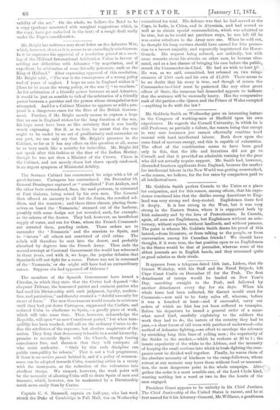Mr. Bright has written a very short letter on the
Ashantee War, which, however, short as it is, seems to us exceedingly mischievous. In it he expresses his approval of a resolution passed at a meet- ing of the Midland International Arbitration Union in favour of settling our difficulties with Ashantee "by negotiation, and if expedient, by arbitration of some friendly potentate, such as the King of Holland." After expressing approval of this resolution, Mr. Bright adds, "The war is the consequence of a wrong policy and of years of neglect. I hope no man in England wishes it" [does he he mean the wrong policy, or the war ?] "to continue." As for arbitration of a friendly power between us and Ashantee, it would be just as sensible to talk of the arbitration of a friendly power between a garotter and the person whose strangulation was attempted. And for a Cabinet Minister to approve so wild a pro- posal is a dangerous omen for the fibre of the British Govern- ment. Further, if Mr. Bright merely means to express a hope that no one in England wishes for the long duration of the war, his hope must have been so like certainty that it was hardly worth expressing. But if, as we fear, he meant that the war ought to be ended by an act of pusillanimity and surrender on our part, we can only say that Mr. Bright's presence in the Cabinet, so far as it has any effect on this question at all, seems to us very much like a security for imbecility. Mr. Bright did not speak after this fashion at the time of the Indian Mutiny, though he was not then a Minister of the Crown. Chaos in the Cabinet, and not merely chaos but chaos openly confessed, is an urgent symptom of Ministerial debility.


































 Previous page
Previous page